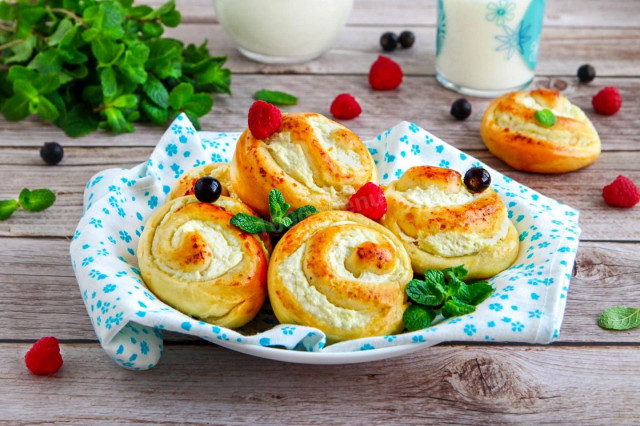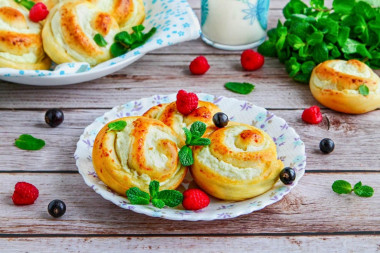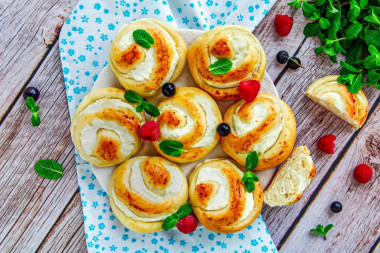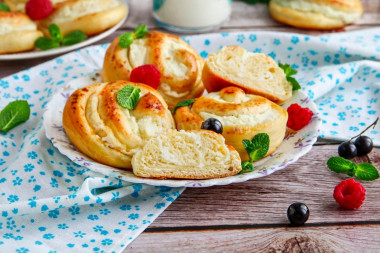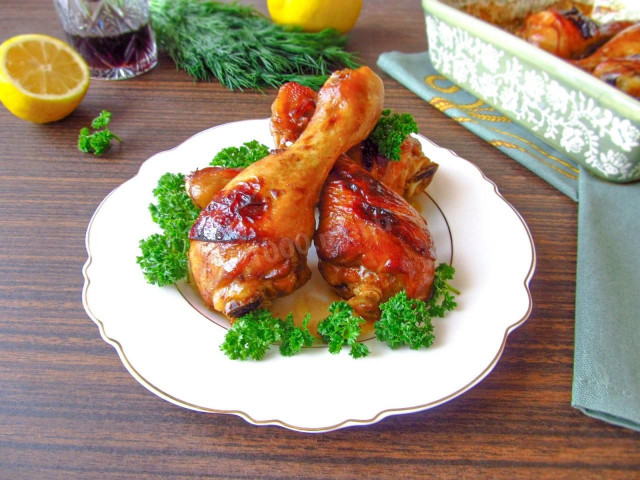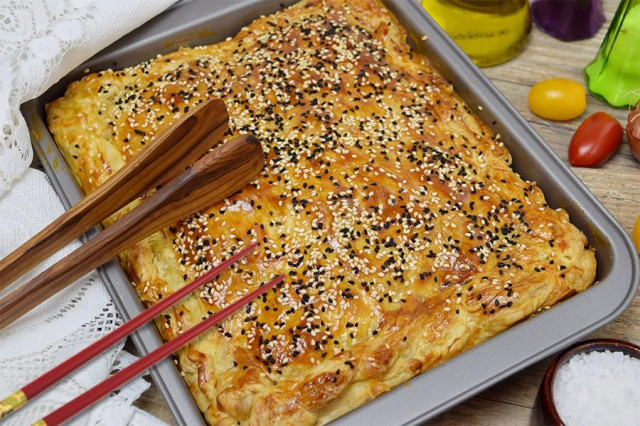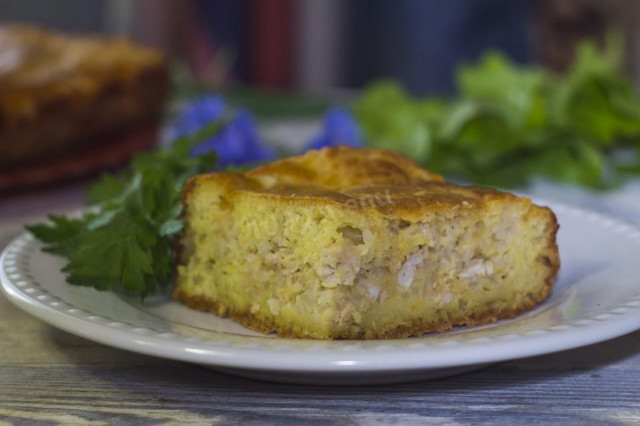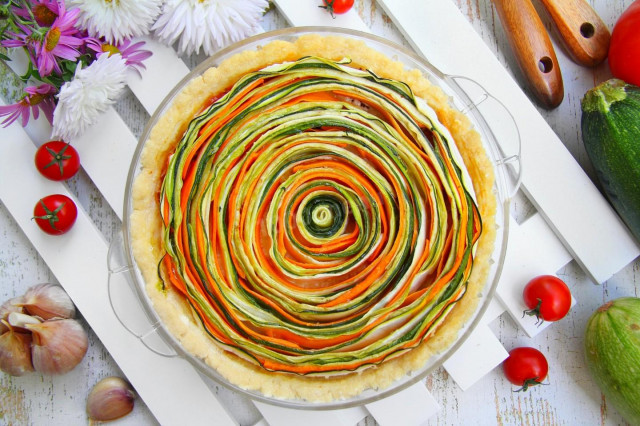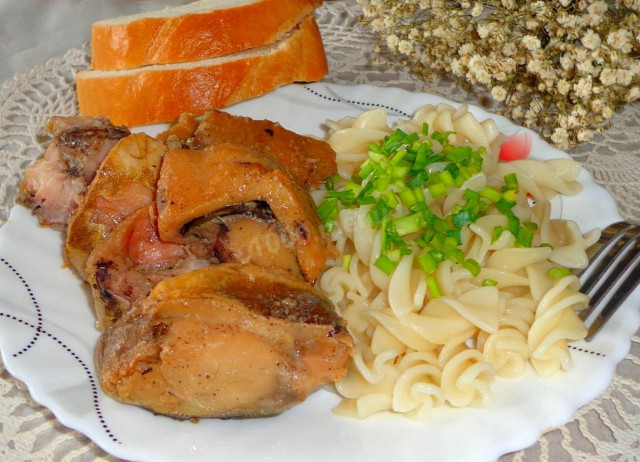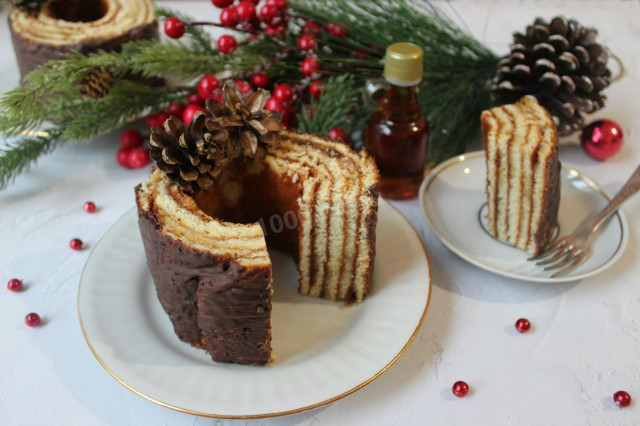Composition / ingredients
Step-by-step cooking
Step 1:
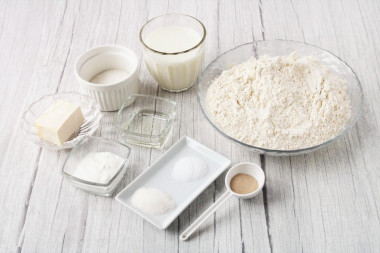
How to make buns with cottage cheese from yeast dough? Measure out the necessary ingredients for the dough. Take wheat flour of the highest grade. Milk and sour cream will suit any fat content. Heat the milk slightly.
Step 2:
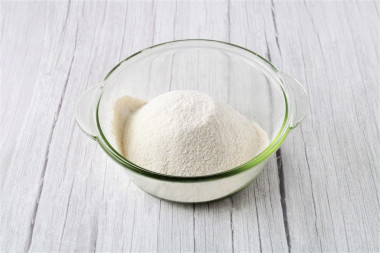
In a wide bowl with high sides, sift the flour so that it is enriched with oxygen. Thanks to this dough, it will be easier to rise, and the baking will turn out lush and airy.
Step 3:
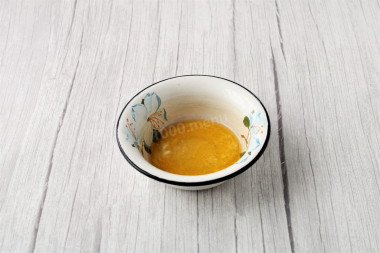
Dissolve the butter over low heat or melt it in the microwave. Cool the oil to a slightly warm state.
Step 4:
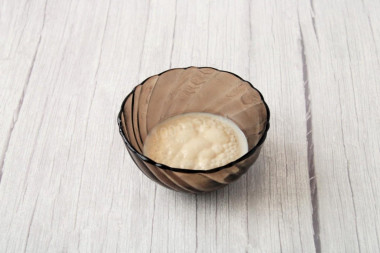
In a small bowl, combine the yeast, 1 tsp sugar and about half the milk. Mix everything well and leave for 10-12 minutes to activate the yeast. A foam cap will appear on the surface.
Step 5:
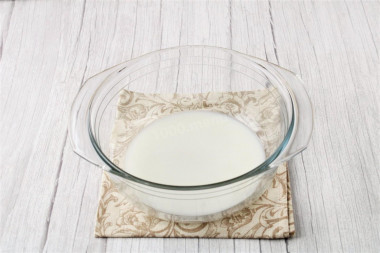
In a spacious container, dissolve salt, sugar and vanilla sugar in the remaining milk.
Step 6:
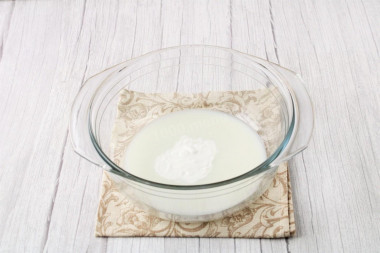
Add sour cream, mix.
Step 7:
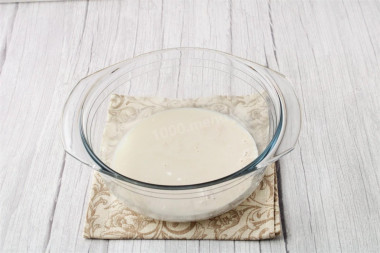
Pour in the yeast mixture, mix lightly.
Step 8:
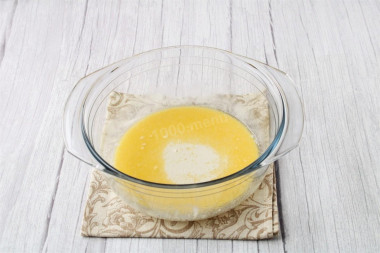
Add vegetable oil and melted butter, mix. The oil should not be hot.
Step 9:
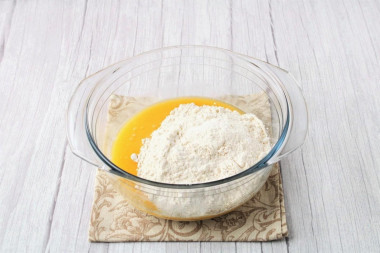
Pour the sifted flour (about 3/4) into the resulting mass. Do not pour out all the flour at once. It may require less (or more) of the specified amount, since flour has different properties. Mix the dough first with a spoon.
Step 10:
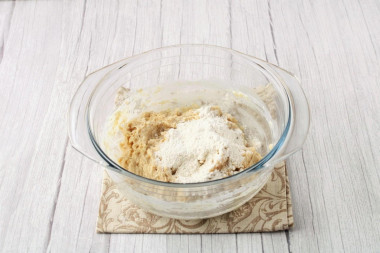
The dough is still quite sticky. Add the remaining flour in small portions, while stirring the dough with your hands. It is important to monitor its consistency so that it does not turn out too steep.
Step 11:
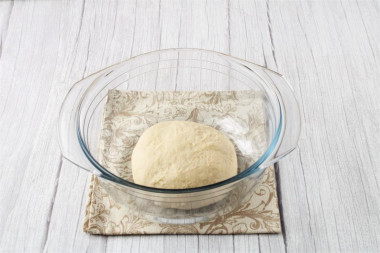
The dough is soft, pliable, not sticky to the hands. Cover it with cling film or a towel and leave it in a warm place to rise for 1 hour 30-1 hours 45 minutes.
Step 12:
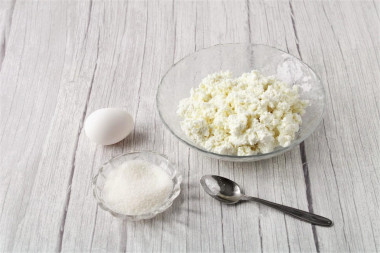
For the filling, take cottage cheese of any fat content. It is better if the cottage cheese is not too wet, but also not dry. If the cottage cheese is flakes, grind it in a blender so that the filling is more tender.
Step 13:
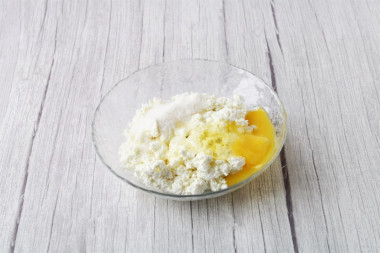
Add egg, sugar and vanilla to the cottage cheese. Mix well.
Step 14:
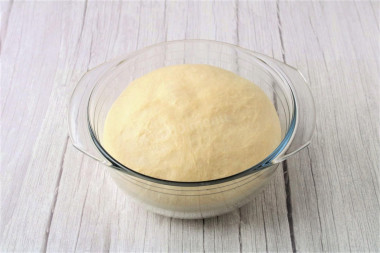
The dough came up, increasing in volume by about 2.5 times. You can start forming buns.
Step 15:
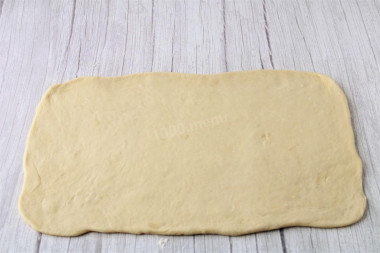
Gently knead the dough, put it on the table, sprinkled with flour. Roll out the dough into a rectangular layer.
Step 16:
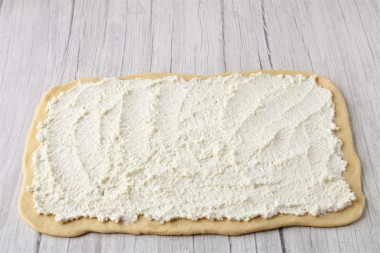
Spread the curd filling on top of the dough, a little before reaching the edges of the layer.
Step 17:
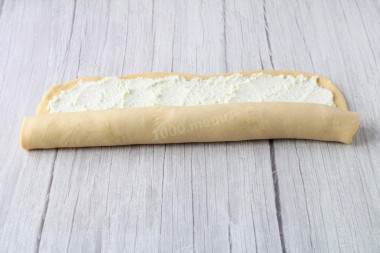
Roll the dough with the filling into a roll.
Step 18:
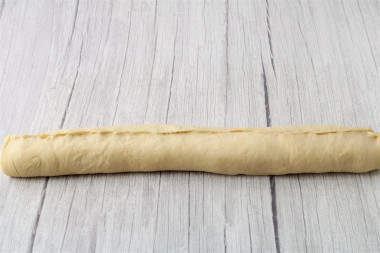
Connect the seam of the roll well so that the buns do not unfold during baking.
Step 19:
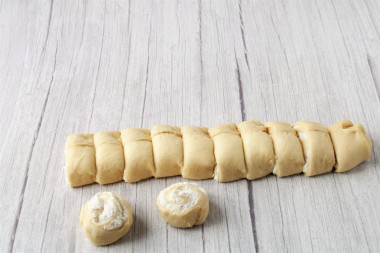
Cut the roll into pieces about 3 cm thick.
Step 20:
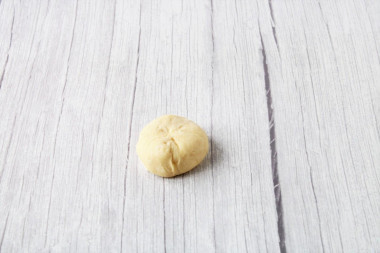
Pinch each small roll from the bottom side.
Step 21:
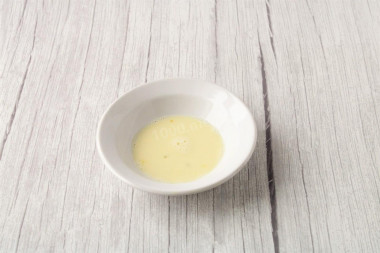
To lubricate the top of the buns, lightly beat the yolk with milk with a fork until smooth.
Step 22:
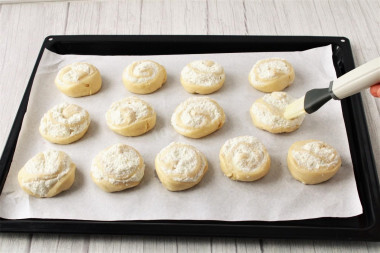
Place the formed buns on a baking sheet lined with parchment and leave for proofing for 15 minutes, covered with a towel. Before baking, lubricate the buns with a cooking brush with a yolk mixture.
Step 23:
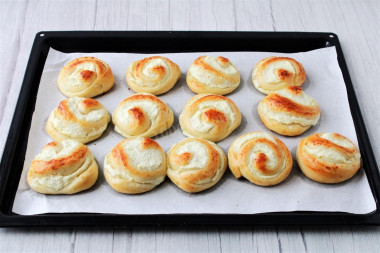
Bake the buns in a preheated 180C oven for 25-30 minutes until browned.
Step 24:
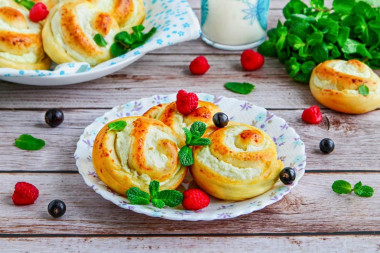
Cool the finished buns and serve them to the table. Bon appetit!
How to melt butter in the microwave? Cut the butter into small pieces and place it in a special container. To prevent the oil from splashing when heated, cover the oil vessel with a paper towel. The oil should be melted either at the lowest power or in defrosting mode. At first, five seconds will be enough. Next, if the butter has not melted yet, set it again for 5 seconds and start the microwave. Repeat the process several times until the desired result.
Keep in mind that everyone's ovens are different. The temperature and cooking time may differ from those specified in the recipe. To make any baked dish successful, use useful information about the features of ovens !
So that the oven has time to heat up to the desired temperature, turn it on in advance (10-20 minutes before the start of cooking).
Calorie content of the products possible in the dish
- Whole cow's milk - 68 kcal/100g
- Milk 3.5% fat content - 64 kcal/100g
- Milk 3.2% fat content - 60 kcal/100g
- Milk 1.5% fat content - 47 kcal/100g
- Concentrated milk 7.5% fat content - 140 kcal/100g
- Milk 2.5% fat content - 54 kcal/100g
- Sour cream with 30% fat content - 340 kcal/100g
- Sour cream with 25% fat content - 284 kcal/100g
- Sour cream with 20% fat content - 210 kcal/100g
- Sour cream of 10% fat content - 115 kcal/100g
- Sour cream - 210 kcal/100g
- Cottage cheese of 40% fat content - 466 kcal/100g
- Cottage cheese of 20% fat content - 233 kcal/100g
- Cottage cheese of 18% fat content - 226 kcal/100g
- Cottage cheese of 10% fat content - 156 kcal/100g
- Low-fat cottage cheese - 75 kcal/100g
- Cottage cheese with sour cream - 260 kcal/100g
- Fruit curd - 147 kcal/100g
- Soft dietary cottage cheese - 170 kcal/100g
- Vitalinia cottage cheese - 64 kcal/100g
- Cottage cheese "morning" ( "danone") without sugar - 91 kcal/100g
- Cottage cheese - 156 kcal/100g
- Granulated sugar - 398 kcal/100g
- Sugar - 398 kcal/100g
- Butter 82% - 734 kcal/100g
- Amateur unsalted butter - 709 kcal/100g
- Unsalted peasant butter - 661 kcal/100g
- Peasant salted butter - 652 kcal/100g
- Melted butter - 869 kcal/100g
- Vegetable oil - 873 kcal/100g
- Salt - 0 kcal/100g
- Wheat flour - 325 kcal/100g
- Vanillin - 288 kcal/100g
- Egg yolks - 352 kcal/100g
- Vanilla sugar - 379 kcal/100g
- Chicken egg - 80 kcal/100g
- Dry yeast - 410 kcal/100g

